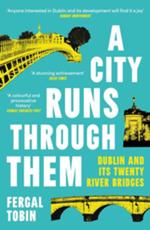Dublin started life on the south bank of the River Liffey and for six or seven centuries that is more or less where the town stayed. In all that time, there was only one bridge across the river. Then, suddenly, in the twenty years after 1670, three more bridges were thrown up and the north side was born. Within a century, Dublin was being talked of as one of the ten largest cities in the whole of Europe. Built over a span of a thousand years, the twenty bridges that now traverse the tidal section of the Liffey have each contributed to the city’s development, as it pushed through the open fields north of the river and east towards the bay, so much so that it is possible to piece together Dublin’s history by tracing their construction in chronological order.Starting with Church Street Bridge, Dublin’s first, which dates back to the Vikings, and ending with Rosie Hackett Bridge, erected in 2014, Fergal Tobin charts the rise of Ireland’s capital city as never before and reveals how, perhaps more than any other city in the world, it has been truly made by its bridges.

A city runs through them : Dublin and its twenty river bridges
ISBN: 9781838959371
Format: Paperback
Publisher: Atlantic (UBD)
Origin: GB
Release Date: December, 2024


